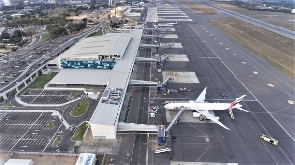 File photo of Ghana's Kotoka International Airport - Terminal 3
File photo of Ghana's Kotoka International Airport - Terminal 3
Government has started stakeholder engagement over the proposed construction of an airport to serve both the Central and Western regions.
The Central region currently has no functional commercial airport, while the military airport in Takoradi is used for scheduled commercial flights.
The decision to construct an airport for each region or one to serve both regions has gone through many phases. Ankaful was initially mooted as the possible location to site an airport for Central Region.
The Central region, which is a major tourism destination in the country, given its rich history and UNESCO World Heritage castles sited along the coast, is only accessible to tourists by road.
Connecting with the regional capital, Cape Coast, from Accra is hampered by heavy vehicular traffic. It takes about two (2) hours to connect from Accra on a typical weekend when many people usually travel for tourism and social events.
Cape Coast played a crucial role in the success of the Year of Return held in Ghana in 2019. Indeed a total of US$1.9 billion was generated into the economy through activities related to the “Year of Return.”
The programme also brought about an increase of over 200,000 in total arrivals into the country.
The Western Region is also one of the country’s most endowed areas and the oil hub. The region also hosts a lot of foreign companies operating in the mining, manufacturing and other sectors.
Presenting the 2023 Budget to Parliament, Finance Minister, Ken Ofori-Atta, gave the clearest indication that one airport will be constructed to serve both regions.
“Mr. Speaker, Phase II of Kumasi Airport Expansion Project is fully completed while Phase III is 89.33 percent complete. Additionally, a draft feasibility report on the Central/Western Region Airport was submitted and is being subjected to stakeholder engagement,” he said.
Commenting on the proposed airport, Sean Mendis, a commercial aviation expert, told AviationGhana exclusively that: “In general though, investment in aviation infrastructure is always a positive thing provided projects also are maintained well. Ghana already has a very robust culture of domestic air travel, and one of the highest number of per capita domestic travellers in sub-Saharan Africa.”
He added that the need for maintenance should be factored into the cost of the projects. “Airports are not build and forget projects unfortunately. They have to be maintained and operated at a professional standard to continue to be operational, so any investment needs to budget for that as well.”
Economic benefits of airports
A study by the International Air Transport Association (IATA) shows that the economic benefits of aviation investment are still large, and provide a strong justification for investment in the aviation industry.
The study found that for developing economies, the annual economic rates of return range from 16% to 28%.
“Developing countries face capital costs, especially for new aircraft, that are similar to those faced by developed countries. As such, though the boost to GDP is higher in proportional terms for developing economies, the capital costs are still high. Nevertheless, the available economic return is still large and provides a strong justification for investment in the aviation industry," he said.
“There are significant and positive benefits generated by investment in aviation infrastructure and services, particularly in developing economies. By increasing a country’s connections to the global air transport network, investment in aviation can boost its long-term productivity and economic growth."
“Greater aviation connectivity – and the improvements in productivity and GDP growth it can provide – can also help to boost a country’s competitiveness. By way of illustration, the World Economic Forum (WEF) has developed a Global Competitiveness Index for the travel and tourism sector."
The WEF’s index incorporates many of the factors necessary to develop connectivity and create wider economic benefits in terms of productivity and economic growth.
There is a clear positive relationship between a country’s connectivity and its performance in the WEF index.